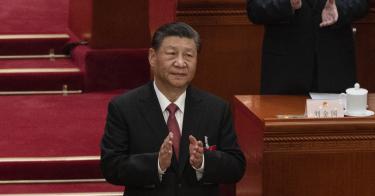The Chinese Communist Party and its leader, Xi Jinping, aren’t doing so well. Sky-high youth unemployment, a tumbling stock market, and continuing real-estate turmoil threaten to derail his “China dream” and possibly drag Xi down with it. And a spate of purges of senior officials over the past year—some of them former Xi proteges—has fueled speculation that his position in the party isn’t as secure as it appears.
At least this is the narrative presented in much of the western media discourse. The Communist Party sees things differently.
This was obvious from the recently concluded annual session of China’s rubber-stamp National People’s Congress (NPC). The week-long session is the most important yearly gathering in China’s political calendar, establishing an official narrative of the past year’s performance and setting priorities for the year to come. Everything presented at the congress is first approved by the ruling Communist Party after a lengthy period of drafting and deliberation, making it one of the clearest windows into the party’s thinking.
>>> The Truth About Investment in China
Judging from the NPC session, the party doesn’t see itself as a regime in crisis. The Government Work Report, presented by Premier Li Qiang, portrayed a China facing “both strategic opportunities and challenges, with favorable conditions outweighing unfavorable ones.” This isn’t hollow propaganda—the work report is the most authoritative statement of high-level policy for the year ahead and is designed primarily for internal government audiences.
The report acknowledges the year won’t be easy, due to geopolitical pressure, weak external demand, and a host of domestic economic challenges and financial risks. Nevertheless, its tone is, if anything, triumphant, pointing out that these challenges didn’t prevent China from reporting solid 5.2% economic growth last year. The report neglects to mention the low baseline due to terrible economic performance in 2022 or the widespread questions around the accuracy of official figures—Rhodium Group places last year’s growth at closer to 1.5%. In any case, the party is confident enough that it set a target of “around 5%” growth for 2024 as well.
As for Xi’s leadership, the work report credits him with single-handedly leading China through the economic and political challenges of 2023. “We owe our achievements in 2023 to General Secretary Xi Jinping, who is at the helm charting the course,” it said. This is unprecedented language—previous work reports gave all credit to “the strong leadership of the Party Central Committee with Comrade Xi Jinping at its core.” Rhetorical upgrades like this make a world of difference in an uber-formalistic system in which every word matters.
And it’s more than just rhetoric. Xi’s “New Era” vision permeates nearly every section of the work report. Furthermore, the NPC on Monday passed new revisions to the Organic Law of the State Council, which further strengthened the Communist Party’s control over China’s cabinet and made the cabinet responsible for implementing Xi Jinping Thought. The entire PRC government was already answerable to Xi in practice, but now it’s more official.
Indeed, by all appearances, the Communist Party is happy with Xi’s leadership. But how can this be, given the economy is a mess and investor sentiment is at a multi-decade low? The answer is simple: These aren’t the metrics the party uses to measure his performance. Western audiences seeking to gauge Xi’s political fortunes should take note.
Under Xi, the Communist Party is more firmly in control than it has ever been, thanks to both its more complete control over government decision-making and the surveillance state that enables it to quickly detect and neutralize dissent. Nothing matters more to the party than its political control. Investors can moan, but they aren’t Xi’s constituents. The Chinese people aren’t even his constituents. His sole constituent is the Communist Party, and it is far more interested in preserving and strengthening its grip on power than overseeing a thriving economy.
>>> Is Taiwan About To Declare Independence? Not Exactly
This doesn’t mean the economy isn’t important. To the contrary, it’s one of the party’s most powerful tools for pursuing its political aims. But the breakneck growth of the reform era was unsustainable and riddled with long-term risks. The party has long seen a need to restructure its economy by addressing these risks and transitioning to a more sustainable—albeit slower—growth model. This is exactly what Xi is doing, and his ruthlessness and unprecedented consolidation of power have helped him get past the vested interests that prevented his predecessors from making significant progress in this endeavor.
Of course, the party can’t neglect economic growth. But it only needs enough growth to maintain stability as it pursues grander priorities such as a regulatory overhaul, technological self-reliance, and evening out the wealth gap through “common prosperity.”
The leadership are well aware that these efforts work in opposition to growth, but they see them as crucial to reducing the risk of crisis in the longer term. They could take their foot off the pedal if they feared the short-term damage to the economy was starting to risk precipitating the very crisis they seek to avert. Or they could unveil a major stimulus, as their predecessors did in previous periods of economic difficulty. So far, they’re doing neither, and the fact that they continue to press forward with their economic restructuring is one indication that they think they have things under control.
Are they correct? Only time will tell. For all anyone knows, Xi’s leadership could rest on a giant house of cards that will eventually come crashing down. But America shouldn’t bet on a rapid collapse or sustained weakening of the regime in Beijing. China has proven naysayers wrong many times before, and the Communist Party appears genuinely confident that it will do so again.
This piece originally appeared in The National Interest https://nationalinterest.org/feature/chinas-economy-trouble-xi-jinping-210043



